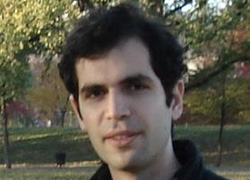Room 3.3B01, “Sala de Juntas”, Rey Pastor Building (Library), University Carlos III of Madrid, Avda. Universidad, 30, 28911 Leganes – Madrid
Abstract:
Wireless ad hoc networks have emerged to be used in scenarios where it is required or desired to have wireless communications among a variety of devices without relying on any infrastructure or central management.
One of the fundamental operations in wireless ad hoc networks is broadcasting, where a wireless device (simply called a node) disseminates a message to all other nodes in the network. A major challenge of efficient broadcast algorithms is to reduce the number of transmissions required to disseminate a message. Unfortunately, minimizing the total number of required transmissions is an NP-hard problem even when the whole network topology is known by every node. Reducing the number of transmissions becomes more challenging in local broadcast algorithms, where each node makes decision (whether or not to transmit a received message) based on local neighborhood information. The common belief is that local broadcast algorithms are not able to guarantee both full delivery and a good bound on the number of transmissions.
As part of this talk, I will describe one of our proposed local broadcast algorithms and show why it can guarantee full delivery with a small number of transmissions.
Bio:
Dr. Khabbazian received his B.Sc. degree in computer engineering from Sharif University of Technology, and his M.A.Sc and Ph.D. degrees both in electrical and computer engineering from University of Victoria and University of British Columbia, respectively. He is currently a postdoctoral fellow at MIT Computer Science and Artificial Intelligence Lab, where he is working with Professor Lynch on designing and analyzing distributed algorithms. Dr. Khabbazian has received several awards including the University of Victoria Graduate Fellowship, the University of British Columbia Graduate Fellowship, Pacific Century Award and the Natural Sciences and Engineering Research Council of Canada Post Doctorate Fellowship. His research interest includes wireless networks, network security, applied cryptography and distributed algorithms.

The conference will be conducted in English

